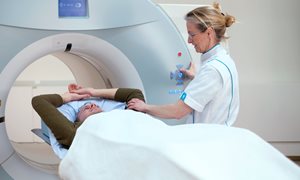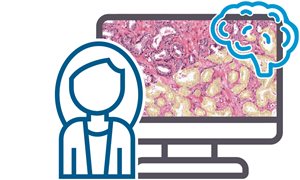
The European Society of Breast Imaging has published new recommendations for screening of women with extremely dense breasts. The association steps away from the uniform approach of a biennial mammography, which is currently the standard for European breast cancer screening organizations. They argue for a more personalized approach, that takes the characteristics and personal wishes of individual women into account.
In the Netherlands, women between the ages of 50 and 75 receive a call for the population screening for breast cancer. They undergo a mammogram, an X-ray of the breasts, to detect abnormalities. The breasts consist mainly of fat, connective tissue and glandular tissue. Eight percent of all women have breasts with extremely large amounts of glandular tissue, called dense breasts. In this group, the risk of breast cancer is twice as high as for the average woman, so for them the population screening is even more important. But mammography does not work well with dense breasts.
The European Society of Breast Imaging (EUSOBI) has now released a new European recommendation, stating that an MRI scan should be used instead of mammography for the group of women with dense breasts. Ritse Mann, radiologist at the Radboudumc and first author of this recommendation, explains why an MRI scan works better: ‘On images of a mammogram, fatty tissue is black and glandular tissue is white. But a tumor is also white. Therefore, if you have a lot of glandular tissue, you are looking for a white tumor in a white background and that is very difficult. An MRI scan then provides much more contrast.'
Better detection
The aim of the new European directive is twofold, says Ritse Mann: 'First of all, we want to ensure that women are informed of their breast density when screened. This is not yet standard practice. Secondly, the MRI scan must become available throughout Europe for women with dense breasts. I think it is important that we offer all imaging techniques that have proven effective, and that women receive good information about the available options and their pros and cons. Women should be able to make their own decisions about whether and how they want to be examined.’
The new recommendation for MRI is largely based on the DENSE study, which was conducted in eight Dutch hospitals. This study examined the value of the MRI scan in women with dense breasts. It showed that the MRI scan saves lives in this group through better detection of cancer. The number of women who died from breast cancer decreased by forty percent, according to the study's modeling. Women would live an average of fifteen years longer in good health if the breast cancer had been detected with MRI. In addition, the scan proved cost-effective.
Personal decision making
A disadvantage of MRI is that the scan detects more abnormalities that turn out to be harmless in follow-up examinations. In addition, an MRI scan takes slightly longer than a mammogram and the injection with a contrast agent is required. The Dutch Health Council has therefore previously advised against the MRI scan. Ritse Mann: ‘I think they are ignoring the fact that women want to know for sure whether they have breast cancer and therefore accept an additional examination. Of course, false positive results are annoying and there are also women who refuse examination for that reason. They have the right to decide for themselves.’
With this new guideline, the European association recognizes the value of the MRI scan and aims for more personalized care. Ritse Mann: 'Breast cancer screening works well and has already saved many lives. But it is still too much one-size-fits-all. I think we need to move more towards risk assessment and then adjust the screening for each individual. That means that you want to examine some women more often, and others less often. We can also better tailor the technique used to the characteristics of the breasts and other risk factors. These new recommendations are a good step in that direction.'
About the publication
This work was published in European Radiology: Breast cancer screening in women with extremely dense breasts recommendations of the European Society of Breast Imaging (EUSOBI). Ritse M. Mann, Alexandra Athanasiou, Pascal A. T. Baltzer, Julia Camps-Herrero, Paola Clauser, Eva M. Fallenberg, Gabor Forrai, Michael H. Fuchsjäger, Thomas H. Helbich, Fleur Killburn-Toppin, Mihai Lesaru, Pietro Panizza, Federica Pediconi, Ruud M. Pijnappel, Katja Pinker, Francesco Sardanelli, Tamar Sella, Isabelle Thomassin-Naggara, Sophia Zackrisson, Fiona J. Gilbert & Christiane K. Kuhl. On behalf of the European Society of Breast Imaging (EUSOBI).
-
Want to know more about these subjects? Click on the buttons below for more news.
More information
Annemarie Eek

wetenschapsvoorlichter
Related news items

Arthritis drug use to limit antibiotics in blood cancer Drug Anakinra strengthens gut lining and inhibits inflammation
12 May 2022 Researchers from the University of Adelaide and the Radboud University Medical Center have repurposed an arthritis drug to restrict the use of antibiotics in the treatment of side effects caused by blood cancer, including leukemia, lymphoma and myeloma. read more-(1).jpg.aspx?width=500&height=333&ext=.jpg&type=BlockColumn1Zoom1)
Quilting gives better outcomes in breast cancer surgery Closing cavity after surgery with special suturing technique reduces complications
13 January 2022 Quilting reduces complications after a mastectomy or axillary lymph node dissection and offers many benefits to a patient. With this technique, a surgeon closes the cavity under the wound with needle and thread. A drain is no longer necessary. read more



